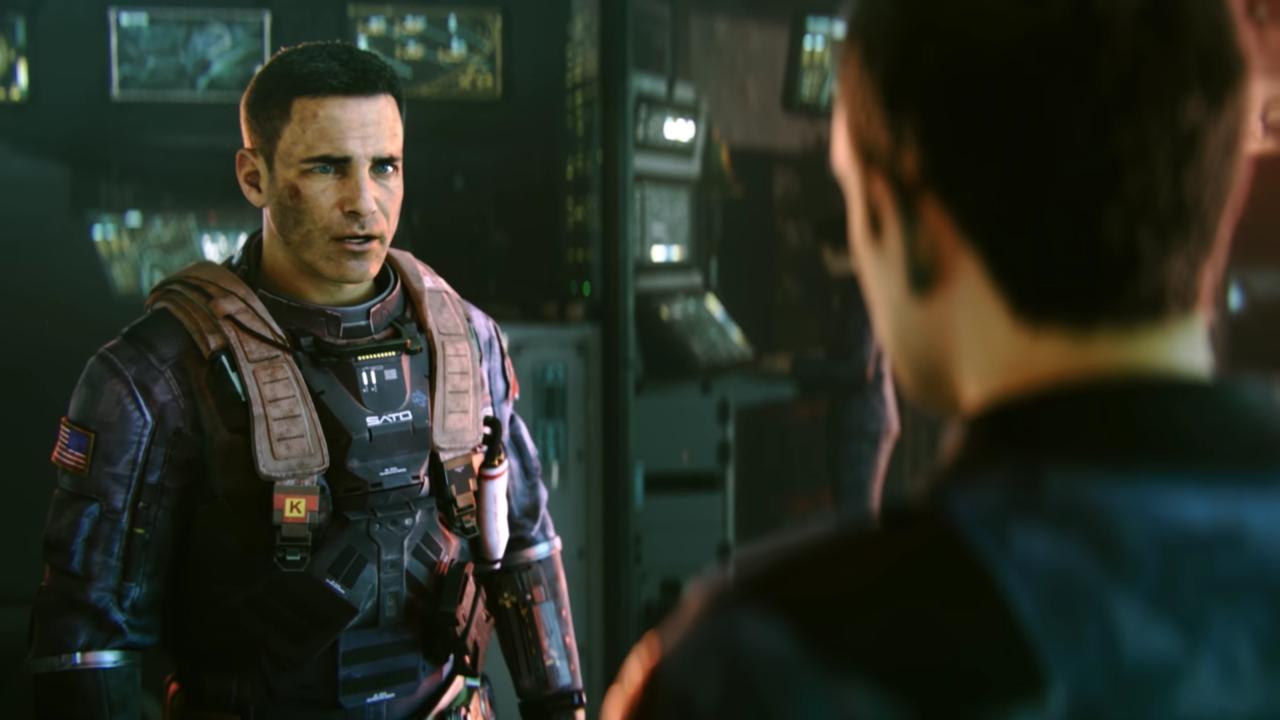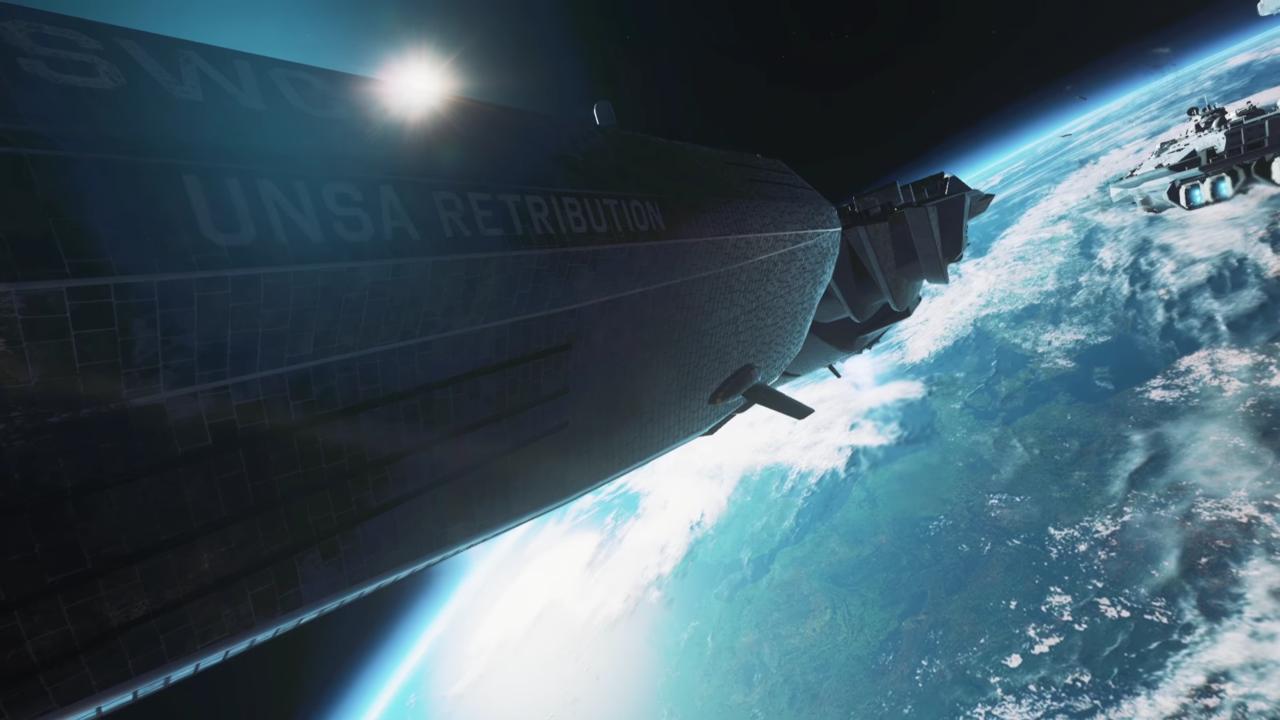In GameSpot's review, Call of Duty: Infinite Warfare's campaign was praised for being the series' "best story in years." And as we learned from the game's star and writer Brian Bloom, this year's Call of Duty tells a more personal story than previous entries.
But how does a story like Infinite Warfare's go from written words to what we see when we play it? That's where director of photography Jeff Negus comes in. Like a Hollywood director, he dictates each and every scene in an attempt to suck in viewers and make them feel the emotion and struggles of each character.
We talked to Negus about bringing Call of Duty to life, the creative satisfaction of working in space, and the large amount of crossover between filming for video games and shooting for live-action movies.
How does what you do factor into the narrative of the story?
Jeff Negus: I work closely with [narrative director] Taylor [Kurosaki] and [writer and star] Brian [Bloom], as well as everybody else, but mostly Taylor and Brian day-to-day. I basically take the stuff that they have come up with, the stuff that they write, and try and figure out where the rubber meets the road, and how do we get that into the game to make it reality.
A lot of the time is spent brainstorming on how we're going to shoot a scene, and then once we're on the stage, acting as an assistant director to help facilitate, get the shoot done. We get data on the day. We get motion capture. We get facial data. We get all of those different performances, and we bring them back to the studio and I'll edit a performance. I'll edit facial performance as well, audio, and then past that, when we're doing cinematic scenes, I'll also get into working with cameras. An all-encompassing thing to just try and figure out, what's the best mode to tell the story.
You told us earlier that games don't usually have a director of photography. What's it like translating those skills into video games?
It's been a blast. I've learned a ton on this project. My background, I've actually worked in live production for four or five years before getting into video games, and I think a lot of the same principles apply when you're trying to shoot a scene with that in live action, just that when you get here, the differences being you really can put the camera anywhere. It's a lot more about the lensing and how you frame things up and the editorial of it, versus how you light a scene, and making sure it's all coming from the right key, and all those sorts of things. Those are things you can figure out later. There's a ton of crossover between live action, especially the methodology, the way that things are shot now; there's a ton of crossover between reality and the virtual world.

When you're doing cutscenes for Infinite Warfare, what are some of the emotional or aesthetic things going through your mind?
There's a whole group of people that come together to work on lighting and mood and all those sorts of things, and I think a really important ideology that we have employed for this process is that we try to make aesthetically, tonally, what the scene already is, and not change it. We feel like that grounds you a little more in what the scene is actually trying to say, and what the characters are trying to say, and where they're at. The thing that Taylor was talking about with the parity between the player and the protagonist, these are other, more subtle ways that you can guide the player into feeling something or not. In terms of a lot of these scenes, the stakes are really high.
There's a lot of drama, so we try to make these feel really dynamic, and that's kind of an aesthetic quality, but on the other side of it, we really try to just make this as big. We want to make it look like a blockbuster movie. This is definitely a game, and we want it to feel like this cool, seamless back and forth, but we really tried to focus on making these scenes look like they were shot with very heavy grippage, with really expensive lighting, that some time went into how the blocking was thought out, and that it was ultimately in service of what those characters are feeling, and how the story was progressing.
What are some of the things you'd employ in the attempt to guide players into feeling a certain emotion?
I think it's all just about how you are portraying an emotion. We thought a lot about, how does a mood fit what the character is feeling in any given moment? If there might be a scene that's dramatic where maybe we've lost someone, or maybe there's a difficult mission ahead of us, we might employ a little bit more of a shadow, or we might try and skew our angles a little bit more, or show more singles to create some distance between the two characters. These are all classic film production techniques. We want to sit down and be able to watch these and make them seem like they're a movie. All those techniques from over there, they really do port into the methodology we're using.
How do you balance Infinite Warfare being an all-out blockbuster that has massive set pieces and all-out conflicts with the emotional beats that it's trying to push?
...having those emotional moments that tie you to those characters matter.
A thing we focused on quite a lot in this is peaks and valleys and really trying to show a breadth of emotion. Taylor was talking a lot about how Call of Duty has these traits that people really like and we want to retain them. There are other areas where we want to push the boundary, and see what else we can do. I think the peaks and valleys thing is an important element of that, that there are going to be moments of bombast. There are going to be huge things that happen to these characters, and then there are also going to be things that seem smaller, intimate, and more emotional. The juxtaposition between those two things, we feel that makes it a little bit more impactful. That makes you go along with the ride a little bit more.
When two characters have some trepidation about a decision, or about something that's a difficulty, there's a lot more power in those moments of bombast because of what preceded it, how it was set up, and how there are stakes there. Not just life or death, but also how these people feel about what they're doing. I would say it's only as difficult as anyone trying to employ that sort of methodology, that ultimately, we feel if you want your audience to have those emotions and be along for the ride, that peaks and valleys are really important, and having those emotional moments that tie you to those characters matter.
With all the crazy set pieces and bombastic moments, have you had to rein yourself in at any point during work on Infinite Warfare?
I was not on the team that decided what set pieces were happening when and those sorts of things. I was mostly there for execution and how we realize that vision, but there was a handful of scenes that required us to storyboard out more action-type scenes. In those, I'm not sure there was too much of an issue on pulling back on things as much, because all of the conversations we had, it just kept driving home that we're trying to be grounded.
We're trying to be in this world. What would really happen to these people? Even though this is a future setting, even though this is a thing that's like, we don't really know what that's going to look like, but we're saying this is what it looks like. If that's what it looks like, and we're still people, how do these people react, and how do these moments occur and everything? Even in the bombast, we were trying to make it believable; this is a thing that could happen.

I noticed you have an astronaut tattoo. Is that from 2001: A Space Odyssey?
Yeah.
Well, I know Kubrick said in a lot of ways that it was fun to be in outer space. This game, these exterior shots, was it really fun to be able to work with those?
Dude, yes. This game has been very creatively satisfying in that way. I've never spent time in this world, especially to the degree of visuals that we were able to get into. Obviously, there's a ton of work that goes into the game side of it, the interactive part of it, and I got to spend a lot of time on the non-interactive part of it in the cinematics. I'm inspired by things I've seen elsewhere, but man, there's so many things that I never thought that I would get to commit to a story. It was really fun to be in space, and to be with these characters, that these people are in these dire moments. I didn't expect to be able to be in those situations. It was very cool, yeah.
Do you think the fact that most games don't have directors of photography indicates how important the narrative is to Infinite Warfare?
I think it could be, yeah. It could just be a personal philosophy, but ultimately I think that if there is a consistency overall in how you're interacting with the audience when you're telling a story, that that only stands to solidify the tone and all these things, and makes it a little bit stronger. I think that what you're getting at, maybe it legitimizes things in a different way, and I personally do feel like having somebody, or a group of people, that are able to oversee something and create consistency throughout is a really important element for telling the story. This all kind of started from, I edited for a while before we really got onto the stage and started doing the cinematic scenes. We were doing more in-game scenes, and so I was just focusing on body performance and audio performance, so that you could be anywhere. You are the DP, so you could see these scenes from any angle.
When we got to these other scenes, that's when it became a little bit more important to me that hey, I think it would be a really good thing to have some consistency throughout all these scenes, that all of these have the same look, that you know that these are the same people. It's really easy, I feel like, in video games. There's so many people that work on them. It might be hard to get some consistency, so we tried really hard to make these feel cinematic and grounded.